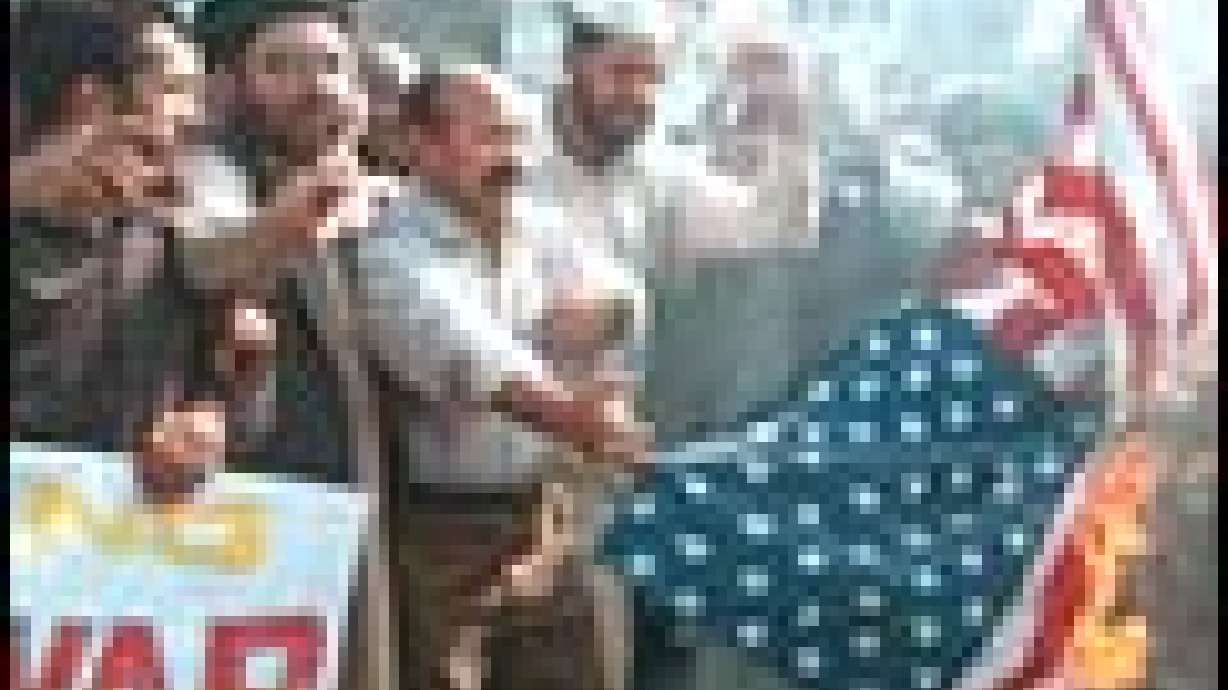Estimated read time: 4-5 minutes
This archived news story is available only for your personal, non-commercial use. Information in the story may be outdated or superseded by additional information. Reading or replaying the story in its archived form does not constitute a republication of the story.
AMMAN, Jordan (AP) -- Furious Arabs stormed Middle Eastern streets Friday, screaming "Death to America" and demanding vengeance for the invasion of Iraq. Gunfire in Yemen killed three people outside the U.S. Embassy.
About 30,000 people assembled after prayers in the ancient Yemeni city of San'a and marched several miles to the embassy.
Riot troops in armored cars held them off with water cannons, tear gas and, finally, live ammunition fired into the air.
Witnesses said a teenage boy was shot dead by a police bullet, and a security official who asked not to be named said a policeman was killed by a protester.
The official Yemeni news agency Saba reported late Friday that two demonstrators had been killed, but gave no details.
The security official said seven other policemen were wounded, and at least 30 demonstrators were overcome by gas.
Yemeni President Ali Abdullah Saleh expressed regret for the casualties and ordered an investigation. In a statement, he said people had the right to express their opinions, but "what happened damages and harms security and the nation."
Saleh stressed he also opposed the war.
In Beirut, Lebanon, Grand Ayatollah Sheik Mohammed Hussein Fadlallah used his Friday sermon to denounce both the United States and Iraqi leader Saddam Hussein.
"We call on the Iraqi people to topple the tyrant who has destroyed Iraq and thrown the Arab and Islamic world into disarray," said Fadlallah, a Shiite.
But, he added, he rejected "Iraq's occupation by the arrogant powers, particularly America."
In a statement faxed to The Associated Press, the Iraqi Communist Party, in exile, blamed both Saddam and Bush for what it said was carnage to come.
"There is no doubt about the dictator's grave responsibility," it said. "But this does not exclude the U.S. responsibility for the harm, the human and material damage that will befall our people."
In Amman, 4,000 Palestinians jammed into a mosque courtyard to hear Hamza Mansour, a cleric leader of the Muslim Brotherhood, urge them to fight back with car bombs and martyr themselves to Allah.
Riot troops pumped tear gas into three crowds of stone-throwing youths in Amman, including one turned away from the Israeli Embassy.
"The Americans are targeting not only Iraq but also our nation, our dignity, our holy land," Mansour told the chanting, cheering crowd.
Behind him on a stage, young men set alight American, British and Israeli flags. A large American flag was spread on the ground at the entrance gate where thousands of feet trampled it to tatters.
In a television address, King Abdullah II said, "I know the pain and anger you are feeling because of the suffering and ordeal that the Iraqi people are suffering," but he urged his subjects to act in "a civilized manner."
Meantime, Amman police entered a downtown mosque and took away two imams who delivered fiery sermons, worshippers said.
About 10,000 angry protesters surged through Cairo, the Egyptian capital, after Friday prayers. Police beat them back with riot sticks and water cannons, leaving several streaming with blood.
In his sermon, Mohammed Sayed Tantawi, the grand sheik of Al-Azhar Mosque, called for jihad -- holy war -- to support Iraqis. "Jihad in Islam is meant to defend ... those subject to injustice," he said. "We have to support and defend the people of Iraq."
A smaller violent protest erupted in Bahrain, and a crowd of Palestinians marched from al-Yarmouk refugee camp near Damascus, Syria, carrying portraits of Saddam Hussein and Yasser Arafat.
The largest demonstration was in Yemen, where an estimated 30,000 chanting protesters converged on the U.S. Embassy to demand that Americans leave their country.
Security forces fired automatic rifles into the air to stop their advance. At least two people -- one demonstrator and one policeman -- were killed by stray bullets.
Some Arab voices blamed Saddam Hussein for crippling Iraq and unsettling the region, but most of them nonetheless opposed the American invasion.
Violent messages in the streets were echoed in calmer assessments by a number of academics and analysts.
"People are very angry about this invasion," said Labib Kamhawi, who teaches political science at the University of Jordan. "In the end, extremists will congratulate George W. Bush for unleashing terrorism."
He predicted a two-stage conflict in which Americans would score an initial military victory but then lose out to a protracted, bitter war of resistance.
"These people are not in a mood to surrender their country for free," he said. "It will be like Afghanistan, where occupiers can't go outside the capital, with warlords destroying the country."
While protesters raged in the streets of Amman, shopkeepers watched and spoke their minds.
"This American aggression is unjust," said Rami Abu Salah, 27, among his watches and perfumes. "We only hope for Saddam's victory. Americans are trying to weaken the U.N. so Israel can be stronger."
Even beyond the Middle East, Muslim clerics opposed the invasion.
"This attack is not on Iraq, it is an attack on Islam itself," Syed Ahmed Bukhari told 6,000 followers at Friday prayers in India's largest mosque, in New Delhi.
"The war between right and wrong has begun," he said. "This is a jihad. We have to sacrifice our lives for Islam."
(Copyright 2003 by The Associated Press. All Rights Reserved.)








